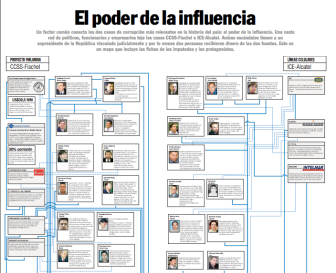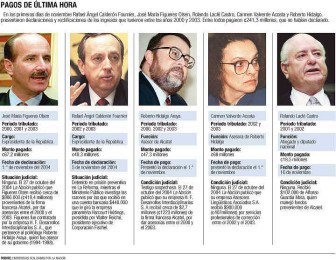La Nación, 2004
About the Investigation

The investigative team at La Nación newspaper in Costa Rica, led by veteran journalist Giannina Segnini, had earned international attention for the strength of its reporting. Segnini had helped introduce data journalism across Latin America, and her team had won their share of prizes for digging into crime and corruption. But even they were surprised when they began following the money trail of the former head of that nation’s social security administration.
Initially, the team found out that the former official was living in a house that costed $750.000, and that the property purchase was in fact a bribe paid by a government contractor. By the end of the investigation, La Nación had implicated three former Costa Rican presidents in receiving questionable payments from foreign corporations.
The team — Segnini, Ernesto Rivera, and Mauricio Herrera — was honored with the 2005 Latin American Investigative Journalism Award for Best Investigative Report on Corruption.
Impact

The La Nación stories sparked investigations by the Costa Rican legislative assembly and prosecutors, and resulted in prison terms, fines, and new anti-corruption laws. Former President Miguel Angel Rodriguez (1998-2002) was sentenced to five years in prison for accepting more than US$800,000 in bribes from Alcatel CIT of France during his presidency. In December 2012 he was exonerated by an appeals court, but the decision was appealed by the prosecutors. The french telecommunications company got a $149 million contract to provide 400.000 cell phone lines during Rodriguez’s presidency. Rodriguez, appointed head of the Organization of American States just a month earlier of the publication, was forced to resign.
Former presidents José María Figueres Olsen and Rafael Ángel Calderón Fournier, as well as other officials involved in the case, had to pay millions in back taxes. (They claim that the payments were consulting honoraria they had neglected to report.) Alcatel-Lucent (formerly Alcatel CIT) was ultimately implicated by the U.S. Justice Department in paying bribes to officials in Costa Rica and three other countries, and forced to pay more than $137 million in penalties. Calderón was convicted on corruption charges but received a reduced sentence of three years by the Supreme Court’s Appeals Tribunal.
“The stories show that investigative journalism was not fed by a judicial investigation, but the opposite way,” observes Segnini. “After each publication, the prosecution ordered simultaneous raids to obtain proof of the facts that we published.”
